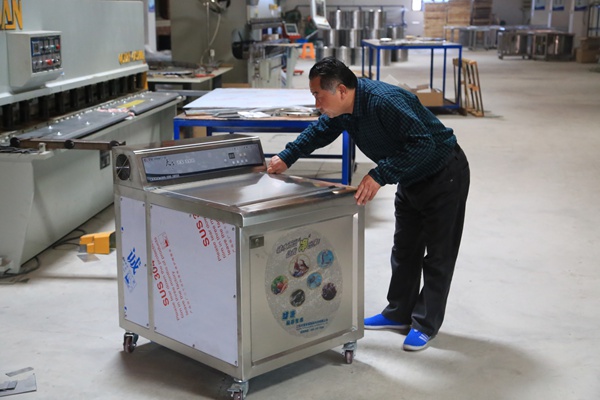Inventor tackles lobsters, vegetables on path to patents
Updated: 2015-06-22 08:30
By LIU KUN(China Daily)
|
|||||||||||
 |
|
Yu Tianwang, a machine fitter, checks a lobster washing machine that he invented. The machine was put into production at a factory in Nantong, Jiangsu province, on June 10.[Photo/China Daily] |
When summer comes around, people like to gather with friends after work to eat lobster and drink beer. Behind the scenes of the seasonal feasting, a 65-year-old entrepreneur has been busily making it easier to cook the crustaceans.
Yu Tianwang, who spent 19 years inventing a vegetable washing machine in Wuhan, Hubei province, turned his attention to lobsters last year after noticing how popular they were as summertime fare.
Using his machine, restaurants can wash 15 kilograms of lobsters in four minutes at a cost of less than 1 yuan. The machine doesn't use detergents or brushes and doesn't kill the lobsters or break their legs. The machine is 30 times faster than its human counterparts.
After China's Central Television aired a segment on his machine in June 2014, Yu received more than 20 calls the next day from people across the country seeking to buy it.
A factory in Nantong, Jiangsu province, has invested 5 million yuan ($805,626) in cooperation with Yu to establish a factory to build lobster washing machines. The first batch of 300 machines, at the price of 19,800 yuan each, were sent nationwide, to cities such as Beijing and Shanghai, and the Xinjiang Uygur autonomous region.
Yu's lobster machine success follows previous achievements in vegetable washing. His initial inspiration was his wife, Liu Hehua, whose hands reddened and split when she put them into frigid water to wash vegetables during the winter months.
"My wife doesn't need to endure that pain if I invent a vegetable machine," Yu said. "Though I just have a junior high school's degree, I'm an experienced machine fitter. I believe I can do that for her."
After quitting his job at a boat-building factory in 1996, Yu devoted himself to the invention after Liu approved the startup capital of 3,000 yuan. The first generation of the veggie washing machine was ready two years later.
"The machine was mainly combined by an iron shelf and a plastic bucket," Liu said. "People living in the whole street can hear the machine when it worked. But the vegetables could be washed clean."
Yu was not satisfied with the first machine. He began to collect materials on the street and from neighbors, such as abandoned plastic tubes and nails, as his monthly salary was only 189 yuan before he turned 60 and received a pension.
The fifth generation of Yu's vegetable washing machine was patented and could wash up to 50 kilograms of vegetables in one hour.
"I also rented farmland in rural areas to grow vegetables by myself," Yu said. "I can test the pesticide residues by washing vegetables that used different amounts of pesticide."
Over the years, he spent more than 200,000 yuan on his inventions and now owns 11 patents. He was awarded "the top innovation" in a Wuhan invention competition.
Now he intends to turn his attention to inventing a small-sized washing machine for families. "I want to free people from trifles such as washing vegetables," he said.
Cang Wei contributed to the story.
Related Stories
China produces first space-based 3D printing machine 2014-12-08 13:58
Trending: Puppy tossed in washing machine 2014-09-07 11:05
Scientific invention contest for students launched 2015-05-07 14:51
China takes new steps to push mass entrepreneurship, innovation 2015-06-16 19:42
China eyes entrepreneurship, innovation for stable employment 2015-05-26 19:08
Today's Top News
Visa process for Chinese traveling through Europe streamlined
Grexit risk hikes
The most costly cities for expats
China, Russia sign railway deal
No mistreatment of GSK sleuth: Govt
Lies and false hopes entrap Xinjiangers
EU seeks to ban animal cloning
HK lawmakers reject election reform proposal
Hot Topics
Lunar probe , China growth forecasts, Emission rules get tougher, China seen through 'colored lens', International board,
Editor's Picks

|

|

|

|

|

|






